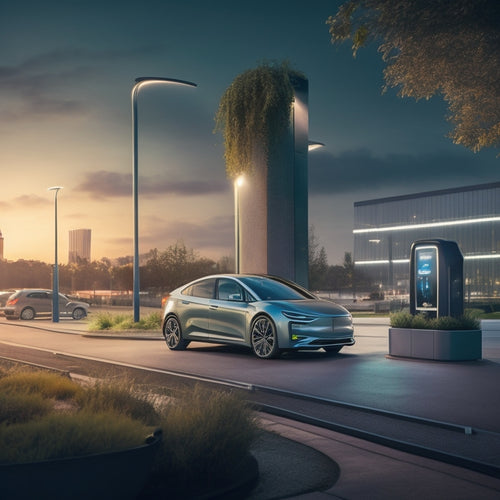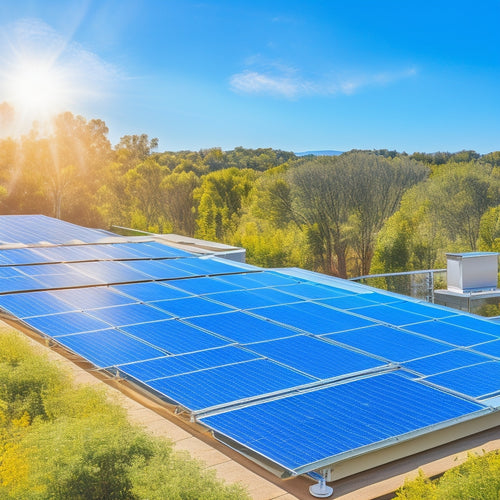
Home Battery System Cost
Share
When considering a home battery system, you're likely wondering about the cost. The truth is, the cost varies depending on your energy demands and the type of system you choose. A reliable home battery system can provide backup power during outages, lower your carbon footprint, and optimize energy efficiency. Deep cycle batteries with high cycle life, like lithium-ion options, can maximize energy storage capabilities while reducing maintenance needs. To get an accurate estimate, you'll need to assess your daily energy usage and identify peak consumption hours. By understanding your unique energy needs, you can make an informed decision about the right system for you - and uncover the true value of investing in a home battery system that's customized to your lifestyle.
The Essentials
- The cost of a home battery system varies depending on the type and size of the battery, with Tesla Powerwall and LG Chem RESU being popular options.
- A typical home battery system can range in cost from $7,000 to $15,000 or more, including installation and necessary equipment.
- Battery costs can be offset by incentives such as tax credits, rebates, and net metering programs that allow selling excess energy back to the grid.
- The overall cost of a home battery system is influenced by the number of batteries required, depth of discharge, and desired backup power duration.
- Properly sizing a home battery system based on daily energy usage assessment can help optimize cost-effectiveness and ensure efficient performance.
Backup Power During Outages
When the grid fails, you need a reliable energy supply to keep your home running smoothly. A home battery system provides power outage protection, ensuring your essential appliances stay on even when the utility grid is down.
Power Outage Protection
You invest in a home battery system to assure your family's safety and comfort during power outages. This backup power system provides peace of mind, especially for those who rely on medical equipment or have young children.
With a home battery system, you can enjoy uninterrupted home energy, even when the grid goes down. In addition, a reliable battery backup for home prevents food spoilage and maintains safety, while also keeping essential devices powered and operational Residential Power Solution.
The system's battery efficiency is optimized through solar integration, allowing you to utilize renewable energy and reduce your reliance on the grid. This not only guarantees emergency preparedness but also yields cost savings in the long run.
By installing a home battery system, you're taking a significant step towards grid independence and reaping sustainability benefits. As technology advancements continue to improve, system installation has become more streamlined and efficient.
Moreover, responsible battery recycling practices confirm that the environmental impact of your system is minimized. By choosing a home battery system, you're investing in a reliable and sustainable solution that prioritizes your family's well-being and freedom from grid dependence.
Reliable Energy Supply
Reliability is the cornerstone of a home battery system, and a dependable energy supply is its most essential function. You're investing in a system that provides energy independence, so you can't afford to have it fail when you need it most.
During outages, a dependable energy supply guarantees your home remains powered, and your family stays safe. With a Solar Power Backup system, you can say goodbye to the inconvenience of lost productivity, spoiled food, and compromised safety during power outages.
Traditional generators can be noisy and polluting, but a home battery system provides a clean and quiet source of backup power.
A home battery system's ability to provide backup power during outages is its most significant feature. It's what sets it apart from traditional grid-tied systems.
With a dependable energy supply, you'll have peace of mind knowing your home is always powered, even when the grid goes down. This is especially vital for those living in areas prone to natural disasters or frequent outages.
Reduced Carbon Footprint Guaranteed
You're switching to a cleaner, eco-friendly energy source by integrating a home battery system, which reduces your reliance on the grid and lowers your carbon footprint.
By storing excess energy generated from renewable sources like solar or wind, you'll decrease your emissions and contribute to a more sustainable future.
With the right renewable energy systems in place, you can optimize your energy storage and maximize your renewable energy savings.
By leveraging advanced energy storage solutions, you can guarantee a reliable backup power solution for your home.
With a home battery system, you can markedly cut down on greenhouse gas emissions and make a positive impact on the environment today.
Eco-Friendly Energy Source
The shift towards renewable energy sources has made home battery systems an attractive option for environmentally conscious homeowners.
You're likely considering a home battery system to reduce your reliance on the grid and lower your carbon footprint. With solar integration, you can store excess energy generated by your solar panels during the day for use at night or during power outages. This not only reduces your energy bills but also provides a clean and sustainable source of power.
Home battery systems offer renewable incentives, such as tax credits and rebates, which can help offset the initial cost of installation. Additionally, many states and utilities offer net metering programs, allowing you to sell excess energy back to the grid and offset your energy consumption.
Lower Emissions Today
By integrating a home battery system with your solar panels, you'll markedly reduce your carbon footprint and lower emissions today.
This sustainable energy solution enables you to store excess energy generated by your solar panels during the day, allowing you to power your home in the evening or during grid outages.
With a home battery system, you'll considerably decrease your reliance on the grid, reducing your environmental impact and moving closer to carbon neutrality.
Deep Cycle Battery Benefits
You'll find that deep cycle batteries offer a longer cycle life, which means they can charge and discharge more times before their capacity starts to degrade. This results in a longer lifespan for your home battery system, reducing the need for frequent replacements.
Long Cycle Life
High-performance deep cycle batteries boast an impressive long cycle life, translating to thousands of charge and discharge cycles over their lifespan, a significant advantage in home battery systems. This means you can enjoy a longer battery longevity, reducing the need for frequent replacements.
With a longer cycle life, you'll experience increased cycle efficiency, as the battery can handle more charge and discharge cycles without degrading. A longer cycle life also means you'll have more opportunities to store excess energy generated by your solar panels or wind turbines, allowing you to make the most of your renewable energy investment.
This, in turn, can lead to significant cost savings on your energy bills. Furthermore, a long cycle life guarantees that your home battery system remains reliable and efficient over time, providing you with the freedom to power your home independently.
When selecting a deep cycle battery for your home battery system, look for options with a high cycle life rating to maximize your investment. With a longer cycle life, you can enjoy the benefits of a reliable and efficient energy storage system, giving you the freedom to live life on your own terms.
Low Maintenance Needs
As you maximize your investment in a deep cycle battery with a high cycle life rating, another significant advantage comes into play: low maintenance needs. This means you'll spend less time and money on battery maintenance, reducing overall maintenance costs.
A well-designed home battery system with a high-efficiency deep cycle battery guarantees system efficiency, enhancing your user experience.
During the installation process, consider warranty options that cover maintenance and repairs. This can provide peace of mind and protect your investment.
Regular performance monitoring helps identify potential issues early, reducing maintenance frequency and the need for troubleshooting tips. With a high-quality deep cycle battery, you can expect component longevity, minimizing the need for frequent replacements.
Assess Your Energy Demands
You need to determine your daily energy usage to accurately size your home battery system. This involves tracking your energy consumption patterns over time, including peak usage hours and seasonal variations.
As you consider renewable energy storage options like Tesla Powerwall and LG Chem RESU, home battery systems can help you identify areas for energy efficiency improvement.
Daily Energy Usage
Determining your daily energy usage is an essential step in sizing a home battery system that meets your specific needs. To get an accurate estimate, you'll need to assess your energy consumption habits and identify areas for improvement. Start by tracking your energy usage over a period of time, ideally a month or more, to get a clear depiction of your daily energy demands.
| Appliance | Average Daily Usage (Hours) | Energy Consumption (Watts) |
|---|---|---|
| Refrigerator | 24 | 150-200 |
| TV | 4-6 | 100-200 |
| Computer | 8-10 | 65-100 |
| Lighting | 8-10 | 20-50 |
| Water Pump | 2-4 | 200-400 |
Energy Consumption Patterns
Within the domain of daily energy consumption, patterns emerge that can notably impact your home battery system's performance and overall cost. As you assess your energy demands, it's crucial to identify these patterns to optimize energy efficiency.
Your consumption trends will influence the size and type of battery system you need, as well as its ability to provide backup power during outages.
You'll want to examine your energy usage during peak hours, such as morning and evening when lights, appliances, and HVAC systems are running simultaneously.
Also, consider your energy-intensive appliances, like electric water heaters or pool pumps, which can considerably impact your energy consumption.
By understanding your energy consumption patterns, you can identify opportunities to reduce your energy demands, making your home battery system more efficient and cost-effective.
This knowledge will enable you to make informed decisions about your energy usage, ultimately giving you more control over your energy independence.
Lithium-Ion Lasts Longer
You're likely to benefit from lithium-ion batteries' longer cycle life, which translates to more charge and discharge cycles before capacity starts to degrade.
This means you can expect a longer lifespan from your home battery system, reducing the need for premature replacements.
With a higher number of cycles, lithium-ion batteries can support more daily charging and discharging, making them a reliable choice for your energy storage needs.
Longer Cycle Life
Reliability is a cornerstone of any home battery system, and lithium-ion batteries excel in this regard. You'll benefit from their exceptional battery longevity, which directly impacts your energy independence.
Lithium-ion batteries can perform up to 5,000 charge cycles or more, depending on the manufacturer and usage. This means you'll get more out of your investment, with less need for frequent replacements.
In contrast, lead-acid batteries typically last for around 1,000 to 2,000 charge cycles. This significant difference in cycle efficiency translates to a longer lifespan for lithium-ion batteries.
You'll enjoy a more consistent and reliable energy supply, reducing the likelihood of power outages and grid dependence. Additionally, lithium-ion batteries retain up to 80% of their capacity even after 2,000 cycles, ensuring you still have a substantial amount of usable energy.
With a longer cycle life, you can confidently rely on your home battery system to provide the freedom and energy independence you desire.
Frequently Asked Questions
Can I Install a Home Battery System Myself?
You can attempt a DIY installation, but be aware of potential safety concerns, like electrical shock and fire hazards, which can be mitigated by following manufacturer guidelines and local electrical codes, ensuring a safe and successful setup.
How Long Does the Installation Process Typically Take?
As you commence this energy independence expedition, you'll steer through a relatively smooth installation timeline, typically taking 1-3 days, depending on the installation complexity, which can range from a straightforward plug-and-play setup to a more intricate, custom-designed system.
Are Home Battery Systems Compatible With All Solar Panels?
You'll find that most home battery systems are designed for seamless solar integration, ensuring battery compatibility with a wide range of solar panels, allowing you to capture and store energy freely, without worrying about system limitations.
Can I Use a Home Battery System With a Grid-Tied Solar System?
You can definitely use a home battery system with a grid-tied solar system, achieving energy independence and extending battery life; this hybrid setup allows you to store excess energy generated during the day for later use.
Are There Any Government Incentives for Home Battery Systems?
You're eligible for federal rebates and state incentives when installing a home battery system, which can greatly offset the cost; you'll want to research and claim these benefits to maximize your energy independence.
Final Thoughts
As you weigh the benefits of a home battery system, it's no coincidence that reduced carbon footprint and backup power during outages align with your values. Evaluating your energy demands, you'll find that deep cycle batteries and lithium-ion options offer impressive benefits. With a system customized to your needs, you'll enjoy a guaranteed reduced carbon footprint and peace of mind during outages. Coincidentally, your commitment to sustainability will also lead to significant long-term savings.
Related Posts
-

Solid State Batteries in Electric Vehicles
Solid-state batteries revolutionize electric vehicles by offering a longer lifespan and higher energy density than tr...
-

What Types of Solar Energy Devices Are Available
You'll find several types of solar energy devices available today, each customized to different energy needs. Photovo...
-

Smart Grid Technology Implementation Challenges
You'll encounter several challenges when implementing smart grid technology, particularly in cost management, scalabi...


